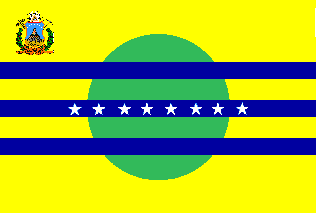 (2:3)
(2:3)by Guillermo T. Aveledo, 3 January 2001

Last modified: 2005-06-17 by dov gutterman
Keywords: bolivar | venezuela | guayana | river | rock | jar | orinoco | eye | star | caduceus | olive tree crown | globe |
Links: FOTW homepage |
search |
disclaimer and copyright |
write us |
mirrors
 (2:3)
(2:3)
by Guillermo T. Aveledo, 3 January 2001
See also:
Municipalities (Capitals):
Bolivar State is often referred as Guayana.
Guillermo Aveledo and Robert Lloyd
Wheelock , 24 September 1999
I'm not sure wether this flag is official (I don't think so),
but in any case is very simliar to the logo of the regional
Government. This flag appears on the Chart of the state flags of
the Bolivarian Republic of Venezuela, printed and made by
"La Casa de las Banderas" of M.D. Bendayan & Cia.
(flag manufacturers). This chart confirms many of the flags we've
reported (although it equalizes their ratios; all are depicted as
2:3, I assume this is due to technical limitations)
The flag consists of a 2:3 yellow field, with a green globe
centered over it. Over the globe, three blue horizontal stripes
float, and, on the central stripe, we see eight white,
five-pointed, stars. On its hoist side, upper corner , we can see
the Bolivarensian CoA. I have not calculated a ratio ofr the
distribution of the stripes or the globe; I did, however, follow
the exact proportions of the chart.
Guillermo T. Aveledo, 3 January 2001
The Flag - Attributes and Semiology: The Bolivarensian Flag
consists of a yellow field with a green circle in the center and
three blue fringes superimposed, with eight five pointed and
white stars placed in the central fringe and the Coat of Arms of
the State on the right superior corner near the staff. The yellow
symbolizes the auriferous wealth of the region; the green, the
forest that surrounds it and the blue, the rivers that are
plentiful there, whilst the stars remember the incorporation of
the Province of Guayana to the cause of the Independence of
Venezuela.
Historical Synthesis: The author of the design and meaning of the
Bolivar State flag is the famous Venezuelan plastic artist Jesus
Soto and entered in force with the Law of Shield, Seal, Anthem,
Flag and other Symbols of Bolivar State on October 10th, 2000.
Sources: Law of the Shield, Seal, Anthem, Flag and other
Symbols of the Bolivar State and complementary review given by
the Secretary of Education, Culture and Sports of the Government
of Bolivar State on 2 February 2001.
Raul Jesus Orta Pardo, 9 Febuary 2001
f.gif)
by Guillermo T. Aveledo, 3 January 2001
The Bolivarensian Coat of Arms consists of a field of azure
charges with a gold river in its inferior part of whose waves
stand out a great rock, representation of that one well-known
"Piedra del Medio" (The Middle-River Stone) located in
front of Ciudad Bolivar, capital of the State. On the rock
appears a sitting female Indian that supports her sinister one in
a clay two-handled jar that pours water on the bed of the river,
symbolizing the inexhaustible flow of the Orinoco, the father of
the Venezuelan hydrical sources. Over the group, appears a
constellation of seven silvered stars in arch
remembering the provinces which confederated in 1811 founded the
Venezuelan Nation. As external ornaments, the shield presents a
radiant triangle with an eye in the center on a silver field
which represents the look of the Divine Providence protecting the
Bolivar State territory. The caduceus at the dexter and the pick
at the sinister crosses in saltire behind the Coat of Arms,
symbolizes the trade, the work and the mining industry,
respectively. The olive tree crown, emblem of the peace, is
jointed by means of gules pennants which present like mottoes the
following ephemeris: "5 DE JULIO DE 1811" (July
5th,1811) the date when the Declaration of the
Independence of Venezuela was signed and ; "15 DE FEBRERO DE
1819" (February 15th, 1819) the date when Republic of the
Great Colombia was founded and "16 DE DICIEMBRE 1863
(December 16th, 1863), the date when the ancient Province of
Guayana was incorporate to the Venezuelan Federation.
Until the moment when we disclose this information, the Bolivar
State doesn't have distinctive Flag officially.
Source: The Sacred Symbols of the Venezuelan Nation,
Francisco Alejandro Vargas, 1981.
Raul Jesus Orta Pardo, 19 September 2000